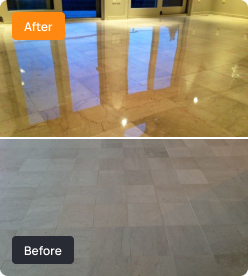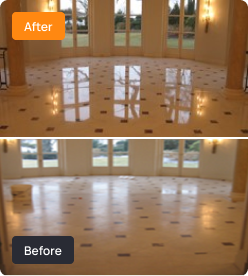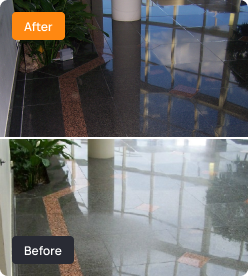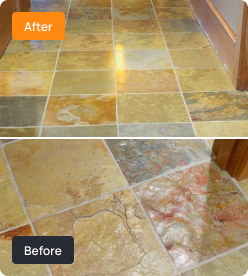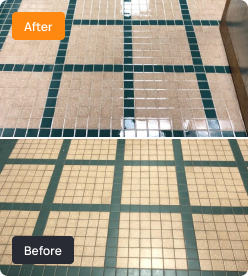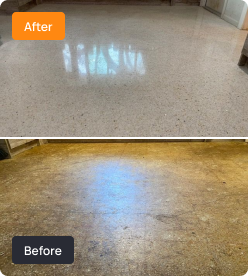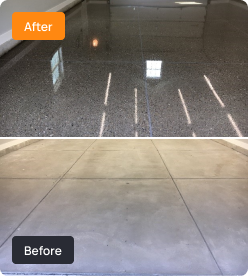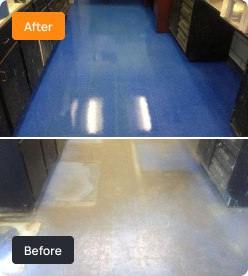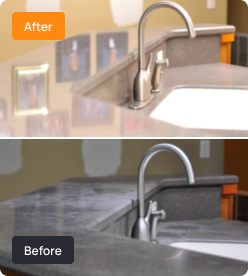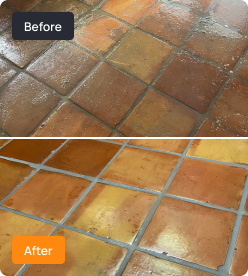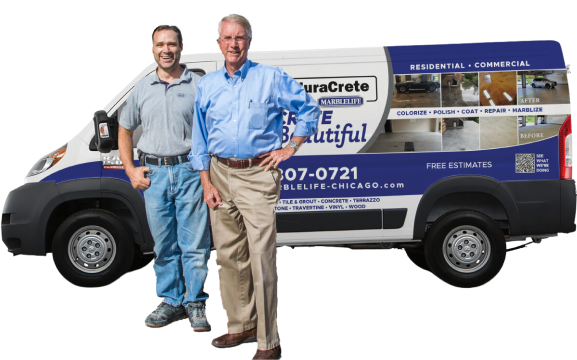Floors Ready for Winter? Here’s What You Need to Know
WINTER IS COMING… …and with it, a whole set of floor challenges. Your floors are about to suffer another round of seasonal attacks from wear, salt damage, freeze-and-thaw cycles, slush, and stained grout. From the constant in-and-out traffic bringing in snow, ice, and salt in the North to the effects of cold snaps and mold […]
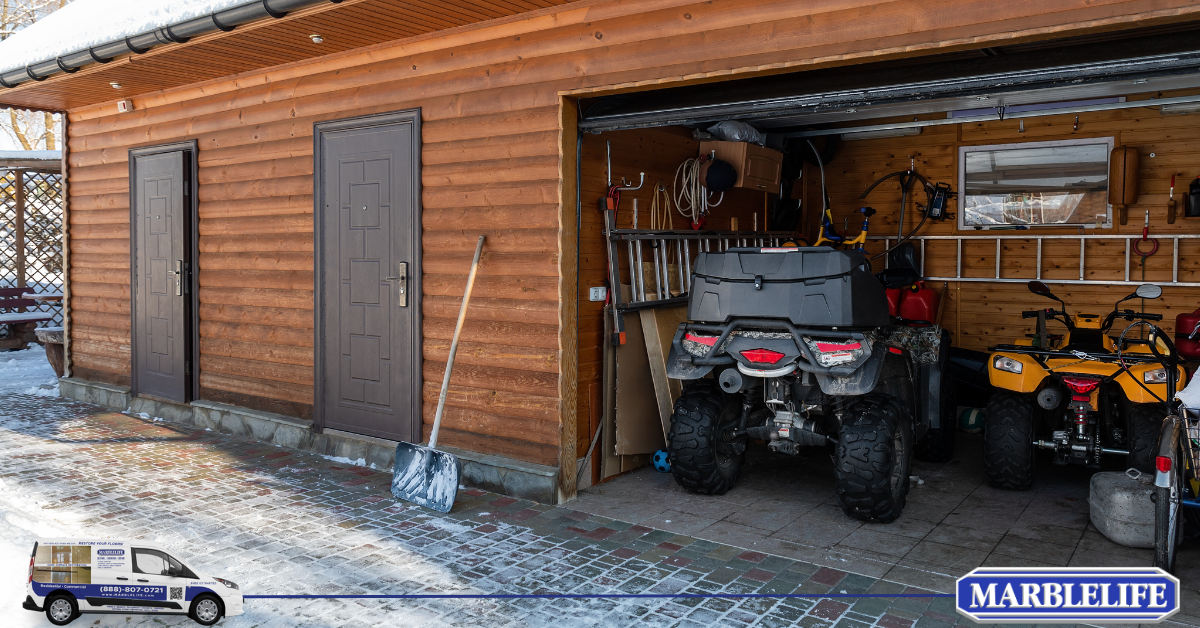

WINTER IS COMING…
…and with it, a whole set of floor challenges. Your floors are about to suffer another round of seasonal attacks from wear, salt damage, freeze-and-thaw cycles, slush, and stained grout. From the constant in-and-out traffic bringing in snow, ice, and salt in the North to the effects of cold snaps and mold darkening in the South, to the freezing temperatures on your garage and driveway, it’s essential to prepare your floors for the season ahead. Proper preparation not only helps maintain the beauty of your home but also ensures safety and longevity for your surfaces.
MARBLELIFE has been a trusted name in floor care and maintenance for years. When it comes to maintaining a beautiful first impression, MARBLELIFE delivers floor care and restoration that is up to the task, regardless of the winter demons who stand ready to descend upon your castle and domain. With MARBLELIFE expertise, we know exactly what it takes to prepare, protect, restore, and care for your floors from the harsh winter elements. Whether it’s your garage, driveway, or entryway, MARBLELIFE offers solutions that keep your floors looking great and performing well all winter long. Winter may be coming…but this is where you get prepared to meet the wintry onslaught.
Protecting Your Garage Floors
Winter can be tough on your garage floors. Snow, ice, and road salts brought in by your car can lead to moisture buildup, increased under-tire abrasion, salt stains, and freeze-thaw-created pockmarks which can damage your concrete appearance over time. Proper maintenance is key to keeping your garage floors in good condition throughout the season, otherwise spring brings with it avoidable concrete repairs.
Importance of Garage Floor Maintenance During Winter
Your garage floor faces heavy use during winter. Snow and ice melt off your car, bringing in moisture and road salts that can deteriorate and stain the surface. Taking proactive steps to protect your garage floor can prevent costly repairs and extend its lifespan. A winter freeze coupled with a little water and spring arrives to find new pockmarks in the driveway by the garage door, under the gutter spouts, and in the shadow of your sprinkler driveway overspray.
Combatting Snow and Moisture
To safeguard your garage floor and driveway from the rigors of winter, focus on two essential practices: ensuring proper drainage and routinely using squeegees or brooms.
Ensuring Proper Drainage and Water Runoff
One of the most effective ways to protect your garage floor and driveway is by ensuring proper drainage. Make sure your garage floor has a slight slope to help water run off instead of pooling. This prevents water from seeping into the concrete and causing cracks when it freezes and expands. Minimize sprinkler spray on patios, sidewalks, and driveways. Forget to turn off the sprinkler before the first freeze of the system, and you could wake to pockmarks created by water frozen to ice which expands 9-10% in volume with enough pressure to pop-the-top off the driveway surface above the frozen water.
Regular Use of Squeegees or Brooms
Regularly using a squeegee or broom to push out water, slush, and dirt can make a big difference. This simple step helps keep your garage floor dry and reduces the risk of moisture damage. Make it a habit to clear out any puddles or wet spots as soon as possible. It’s generally not an issue the day you pull in after traversing through the snow, but rather the grinding associated with driving over the road salt and cinders that are left after the snow melts. This might as well be sandpaper as it tears into the concrete surface, or your new garage coating, or polished concrete. A periodic sweep out will amaze you on how much material can be swept out.
Sealing the Garage Door
A good garage door seal is essential for keeping out drafts, dirt, and moisture. The coldest place in the garage is along the garage door seal, particularly a poorly sealing one. This is where outside snow and ice get melted in early afternoon by the warmer garage air, only to freeze in mid-evening creating our pock-mark creating freeze-thaw cycle along the garage door edge. By ensuring your garage door seal is in good repair, you can prevent snow and water from flowing in. Sealing the driveway and garage surface keeps the water on the surface to freeze, versus inside the concrete where it can damage and rupture the surface. Sealing your concrete driveway is a quick process but has enormous impact on the longevity and beauty of your driveway, defeating pockmarks but also combating mold by closing out the surface pores mold spores love to settle into.
Energy Conservation
Sealing your garage door also helps with energy conservation. By keeping cold air out and warm air in, you can make your garage more energy-efficient. This not only makes the space more comfortable to use during winter but also reduces your heating costs.
Preparing Your Driveway
Your driveway is one of the most exposed parts of your property, making it particularly vulnerable to winter’s harsh conditions. Snow, ice, and freeze-thaw cycles can cause significant damage if not properly maintained. Preparing your driveway before winter sets in is crucial for its durability and safety.
Vulnerability of Driveways to Winter Conditions
Driveways face the full brunt of winter weather. The combination of moisture, freezing temperatures, and road salts can lead to cracks, spalling, and overall deterioration. If left unchecked, these issues can become major problems by spring, requiring extensive repairs. Its susceptibility is most severe during the change of seasons, versus in the depths of winter, as it is the transition from warm to freezing cold that creates the damage. Said another way, it’s the transition from above 32F to below 32F that freezes water allowed to penetrate the driveway, expanding 10% as ice and blowing the top off your concrete surface. This is problematic, as this means you need to treat your driveway BEFORE the first late-night freeze. Similarly, in early spring as the temperature rises, we encounter periods above and below freezing again.
The issue here is that the driveway must be sealed and cured BEFORE that first fall freeze. The good news is there is no benefit to waiting. We can address it now or we can address it after the damage has occurred in spring. There is no benefit to waiting. Procrastinate at one’s own demise, which can result in higher repair costs. Best to check it off while you are thinking of it.
Steps to Take Before Winter Sets In
Before winter fully sets in, it’s crucial to take proactive steps to prepare your driveway for the harsh conditions ahead. Start with these essential steps:
Cleaning the Driveway
The first step in preparing your driveway is thorough cleaning. Remove all debris, dirt, and any organic material like leaves, moss, or mold waste. This can be done using a power washer. Power washing is preferred over a stiff brush as we are seeking to clear the concrete pores of debris that would prevent the seal from entering and sealing the concrete. A brush goes OVER the pore, while the water jet can enter the pore. Cleaning ensures the pore is open to allow the seal to enter and cure so as to prevent water from entering later. The sealing will also reduce the darkening associated with mold.
Repairing Cracks and Damage
After cleaning, inspect your driveway for any cracks or areas of damage. Water can seep into these cracks, freeze, and expand, causing further damage. Use a suitable filler to repair any cracks. For concrete driveways, use a concrete filler; for asphalt, use an asphalt repair mix. Addressing these issues before winter can prevent them from worsening. OR – CALL MARBLELIFE who will get this done as part of their concrete driveway sealing process.
Sealing the Driveway
Sealing your driveway is an essential step in protecting it from winter conditions. A good quality sealer will create a barrier against moisture, road salts, and chemicals. Make sure to choose a sealer appropriate for your driveway material and follow the manufacturer’s instructions for application. Sealing not only protects your driveway but also makes it easier to clean and maintain throughout the winter. As always, maintenance is far less expensive than a repair downstream. We change the oil in our cars to avoid the much more expensive cost of replacing an engine. We seal our concrete driveway and garage to avoid a more costly repair after freeze-thaw damage has occurred.
Benefits of Professional Cleaning and Sealing Services
While DIY cleaning and sealing can be effective, professional services offer several advantages. Professionals have the right tools and expertise to ensure a thorough job. They can spot issues you might miss and use high-quality products that provide better protection and last longer. DIY products stress simplicity of application over performance and often do not provide the protection needed, whereas a professionally installed system can handle greater complexity in order to deliver the long-term benefits desired. Investing in professional services can save you time and ensure your driveway is well-protected against winter’s harsh conditions. Professionals’ experience in repairing damage makes them more sensitive to problem areas as they benefit from repairing the mistakes of others. No need to learn the hard way when we can benefit from the professional’s experience and care and repair.
Entryway and Interior Flooring Protection
Winter brings specific challenges for your entryway and interior floors. From the constant tracking of snow, ice, and salt to the added wear and tear from heavy foot traffic, it’s crucial to take proactive steps to protect these areas. Here’s how you can safeguard your floors effectively.
Challenges Faced by Entryway and Interior Floors
During winter, entryways and interior floors endure a lot of stress. Snow, slush, and salt can be tracked inside, leading to moisture buildup and potential damage. The abrasive nature of salt can scratch and wear down flooring surfaces, while moisture can seep into tiny cracks, causing further damage when it freezes and expands.
Importance of Sealing Floors
Sealing your floors is a critical step in protecting them from winter elements. A good sealant acts as a barrier, preventing moisture and salt from penetrating the surface. It is easier to wipe dirt OFF the sealed surface than figure out how to get a stain out of the open pores IN the surface. Sealing is often discussed as enhancing stain resistance, but in reality, it should be hyped as simplifying our cleaning process by keeping dirt on top of the surface where it is easy to dust, mop, or wipe it away. This helps maintain the appearance of your floors and extends their lifespan by reducing the risk of damage.
Mat Selection and Placement
Choosing the right mats for your entryway can significantly reduce the amount of dirt, salt, and moisture that gets tracked inside. High-quality mats are essential:
- Spaghetti Mats: These mats have an open-back design that traps dirt and salt below the surface, preventing it from being tracked further into your home. The dirt literally falls INTO the mat, preventing that dirt from being walked into the home. They are easy to clean and highly effective at removing debris from shoes. These mats require no BEATING to clean, as dirt literally pours out of them easily, or in the unbacked exterior variant, passes through the mat to be washed away with the next rain OR one can roll it up and sweep away what remains on the surface. In either case, much more effective.
- Bristle Mats: While these mats can help in scraping off dirt, they often flick debris further into the home and are harder to clean. The dirt remains on the surface where it can be advanced into the interior by the next foot it comes in contact with. They are not as effective as spaghetti mats for winter use.
Avoiding Absorptive Mats
Absorptive mats might seem like a good idea, but they quickly become saturated with water and salt. Once they dry, they can release salt dust back into the air, which can be harmful to your floors and indoor air quality. Instead, opt for mats that allow water to pass through or trap it below the surface.
The iconic WELCOME mat is more about marketing our friendliness than protecting our floors or home interior. If one REALLY wants messaging, it can be built into a spaghetti mat. If one wants to enhance floor protection or reduce cleaning effort – get a spaghetti mat custom made for your property, big or small. This is the application of science to surface protection and cleaning ease.
Routine Cleaning
Regular cleaning is crucial to protect your entryway and interior floors from winter’s wear and tear. Establishing a consistent cleaning schedule helps manage the dirt and moisture brought in from outside.
Benefits of Regular Sweeping, Vacuuming, and Mopping
- Sweeping and Vacuuming: Regular sweeping or vacuuming helps remove loose dirt and debris that can scratch and damage floors. It’s not feet or shoes that scratch a marble or concrete floor but rather the dust, salt, hair, or grain of sand underfoot that concentrates all weight through a single point to concentrate pressure high enough to scratch stone. High traffic floor managers may have a lobby dust mopped every 2 hours to maintain a brilliant gloss finish, whereas a home might do so with their weekly cleaning or delegate to the kids’ chore chart.
- Mopping: Use a gentle cleaner to mop your floors regularly. This helps pick up any salt residues and prevents moisture buildup. Be sure to use a cleaner that is safe for your specific flooring type to avoid any potential damage. Use a DAMP mop rather than a WET mop to maximize the ability to lift dirt off the surface and place it in the mop bucket. Yes, you need to empty the mop bucket as soon as you can no longer see the bucket bottom. Remember to periodically remove and launder your mop head, which means you need 2 if you are serious about keeping a clean space.
Post-Winter Care
As winter ends, it’s essential to assess and repair any damage your floors may have sustained. Proper post-winter care ensures that your surfaces remain in good condition and ready for the next season. Here’s how to effectively manage post-winter floor care.
Assessing and Repairing Winter Damage
Winter can leave behind various types of damage, from cracks in your driveway to worn-out areas in your entryway. Early detection and repair are crucial to preventing minor issues from becoming major problems. This is when we learn how good our processes are.
Strategies for Post-Winter Care
Start by thoroughly inspecting your floors for any signs of damage. Look for cracks, pockmarks, and areas where the surface may have worn down. Pay special attention to high-traffic areas and spots where water tends to accumulate. Addressing these issues early can prevent them from worsening.
Thorough Cleaning
After inspecting for damage, give your floors a thorough cleaning. Remove all the dirt, salt, and debris that may have accumulated over the winter. Use appropriate cleaning solutions for each type of flooring:
- Concrete and Asphalt: Use a power washer or a suitable concrete cleaner to remove stubborn stains and dirt. Cleaner choice matters. Don’t fall for the all-cleaners-are-the-same myth; each challenge has an optimal cleaning solution that can make life easy. The wrong product can result in a project becoming frustrating, while the right product can deliver visual immediate results. CHECK OUT MARBLELIFE’s CLEANER FRUSTRATION guides to select the optimal cleaner for your surface and challenge.
- Interior Floors: Use a gentle cleaner to mop and clean surfaces, ensuring that all residues are removed. Use the cleaner as directed. Too much can result in streaks; too little can fail to solubilize oils; directions on usage levels should be followed for best results.
Ensuring Proper Drainage
Proper drainage is crucial to prevent water damage during the winter melt. Make sure your driveways, pathways, and garage floors have adequate drainage systems in place. Clear any blockages in gutters and downspouts to ensure water flows away from your home. Standing ice is a signal of a low point and creates both a slip hazard but also potential to damage concrete or the walkway surface.
How MARBLELIFE Can Help
Winter can be tough on your floors, but with MARBLELIFE’s professional services, you can ensure that your surfaces remain in top condition. Here’s how MARBLELIFE can assist you in maintaining and protecting your floors during and after winter.
Overview of MARBLELIFE’s Services
MARBLELIFE is a leader in floor care and maintenance, offering a range of services designed to keep your floors looking their best. Our expertise extends to various surfaces, including marble, granite, concrete, and more. We provide:
- Cleaning: Professional cleaning services to remove dirt, grime, and stains.
- Sealing: High-quality sealants to protect your floors from moisture, salt, and other elements.
- Repair: Expert repair services for cracks, chips, and other damage.
- Restoration: Comprehensive restoration services to bring back the original beauty of your floors.
- Consultation: This is the MOST OVERLOOKED service MARBLELIFE provides… and it’s FREE. A consultation provides guidance on current damage, and repairs, as well as cleaning challenges and maintenance services that can save you time in the future. MARBLELIFE makes house calls and building calls. We work with homeowners, home managers, building engineers, and property managers around the country as they seek to identify the most cost-effective means of caring for their building and the first impression it creates to all visitors.
Benefits of Professional Intervention and Maintenance
While DIY maintenance can be helpful, professional intervention ensures a thorough and lasting solution. Here are the benefits of choosing MARBLELIFE:
- Expertise: Our team has extensive experience and knowledge in handling various flooring materials and conditions.
- Quality Products: We use top-of-the-line products that are specifically formulated to protect and maintain your floors.
- Time-Saving: Professional services save you time and effort, ensuring your floors are properly cared for without the hassle.
- Long-Term Protection: Our services not only address current issues but also prevent future damage, extending the life of your floors.
Scheduling a Free Consultation
Taking the first step towards protecting your floors is easy with MARBLELIFE. We offer free consultations to assess your needs and provide tailored solutions. During the consultation, our experts will:
-
- Inspect your floors to identify any issues.
- Discuss your specific concerns and goals.
- Recommend the best services and products for your situation.
To schedule your free consultation, simply contact us at 888-463-2780. Our team is ready to help you ensure your floors are well-prepared for winter and beyond.


